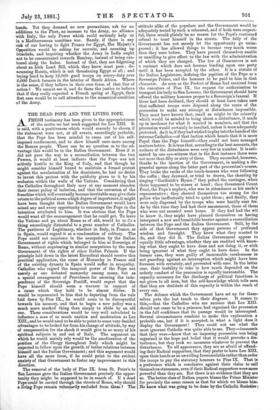THE NEWEST ALARM. T HERE is some ground, we think, for
the sort of uneasiness which is spreading about Foreign Affairs—it is not very deep, or the Money Market would respond—but the ground is not sufficient to justify the panic which many writers are eager to diffuse. It is quite certain that the French Government are worried and alarmed by their position in North Africa, by the rapid spread of revolt in Tunis, by the determined resistance their forces encountered at Sfax—the Arabs stood up to the soldiers in a very ominous way—and by the prospect of a long, indecisive, and harassing campaign against the Arab tribes, along the whole line of their North-African interior. They may be compelled to occupy the sacred city of Kairouan, as a focus of disaffection and hostility ; and if they do, they will incense every Arab tribe from Mogador to Alexandria. It is quite possible, therefore, that the French statesmen, who in military affairs defer to the opinion of the Army, may intend or may be driven, notwithstaiding all their protestations, to occupy Tripoli; that such occupation may be resented by the Sultan, and that the whole "Eastern Question," the distribution of Turkey, may be again this autumn upon the carpet. This, we say, is clearly possible, and there is, therefore, ground for uneasiness ; but the panicmongers are building upon this thin basis an immense superstructure of alarms. They reject the evidence that Frenchmen have made a blunder, just as we did in Candahar. Their theory, when expressed in plain English, is that Prince Bismarck, in his eagerness to consolidate the position of Germany, has agreed to conciliate all surround- ing Powers by partitioning the Turkish Empire. Russia would receive Armenia, or, indeed, Asia Minor ; Austria would extend herself to Salonica ; and France would obtain the whole of North Africa, including Tunis, Tripoli, and Egypt. It is upon the basis of this agreement, the alarmists say, that France is now acting, and the end of the hot weather will see General Saussier, believed by her Army to be its most vigorous officer, at the head of 120,000 men, holding Algeria, moving upon Tripoli, and threatening Egypt. There is, in fact, a regular plot for dismembering Turkey, and redistributing the Sultan's possessions, to the total exclusion of Great Britain ; and in this plot the French Republicans are eagerly taking a share. We do not believe it, for three reasons, to which we think even Jingoes will allow some weight. Putting aside for a moment all moral considerations, which, we are told, have no place in Continental diplomacy, we do not believe that it is the interest of Russia to allow Austria to consolidate her ascendancy over the South Slays, whom St. Petersburg hopes one day to attract ; or that it is the interest of the Hapsburgs to expose their southern flank in that way to a Russian attack via Varna ; or that it is the interest of either Germany or Austria to give Russia Constanti- nople, which is indefensible if she influences Bulgaria and governs Asia Minor ; or that it is the interest of France to purchase a valueless " compensation " at the possible cost of a great war with England, supported by Italy, and possibly by Spain. Putting aside the larger question— the partition of all Turkey—which is much too large to discuss, let us look quietly at this fraction of the plan, which involves Great Britain in a direct way, and which has this for evidence, that France is advancing eastward along the coast of Korth Africa. How is France to seize Egypt ? Clearly, if she is to do it via Tunis and Tripoli, Great Britain will have ample warning, for enormous forces must be landed in Algeria and Tunis, must be provisioned for a desert march such as would have alarmed Napoleon, and must first of all subjugate or pacify the Arab tribes, who will not fight a pitched battle, but who can move at thirty miles a day, and who would fall incessantly on every line of land communication. On the other hand, if she is to do it by sea,—that involves a maritime war ; in which the British might prevail, in which they would have an Italian alliance, and in which France might lose in six months La Reunion, Cochin China, her Indian settlements, her foreign trade, and her communication with North Africa. Of course, war is war, and has its "fortunes ;" but no reason- able Frenchman would deny that this result was possible, or that England could enter Egypt from two sides, or that the war would inflict an almost crashing fine upon the French peasantry, who would lose their best market for their wine, and upon some French industries, such as silk. Such a war would affect the wealth of France, now so pas- sionate an object with all Frenchmen, as severely as the German war affected her prestige, even if Germany could resist the temptation to keep out of it, and Italy struck no stroke to recover Nice and Savoy. And the French statesmen, who are not dreamers, but cool, sensible persons, quite sufficiently aware of their internal difficulties, are to break up the alliance with England, which guarantees them everywhere but on the Rhine side, and fling away the prosperity of a generation, and risk the rise of a great soldier to dictatorial power, for what ? "In the hope of compensation," it is answered, "for the loss of Alsace-Lorraine." That hope lies, we dare say, very.near to French hearts; but where is the compensation ? France would have no more subjects, but only some millions of enemies ; no more soldiers, but only more stations to waste them on ; no more revenue, but only more drains upon her Treasury. If France could conciliate Arabs as she has conciliated Germans in Alsace and Italians in Nice, we could imagine such a dream, or if she had even the British secret of obtaining revenue from reluctant Asiatics ; but she has not conciliated even her own native levies, and Algeria has never paid. The enjoyment of inflicting a humiliation on England will not tempt her, as it would have done sixty years ago, for her foe is Germany, not England ; and Egypt, as a strategical position, though invaluable to England, is worthless to France, which could never get out of the Red Sea without English permission, and could only fine, but not ruin, English shipowners by shutting the Canal. That Prince Bismarck would like to see France so placed that England would be permanently hostile to Paris, and friendly to Berlin, we can conceive ; but that the adroit managers now governing France should desire it, is to us incredible. They want to re- cover their provinces, or at all events Lorraine, and it may be, at some distant time, to acquire Belgium ; not to waste them- selves over the endless extent of North Africa, and make England on the west as jealous as Germany on the east. No province like Egypt, which can be shut up by a British Fleet, can compensate to France for Continental territory.
But the French are in Tunis, and are threatening Tripoli? Yes, and we were in Afghanistan, and were threatening Russia in Asia. Nations, under bad guidance, sometimes get carried away in that fashion ; but neither Tunis nor Afghani- stan involved a great maritime war. The way to look at it is to ask ourselves whether, with all their fancied reasons for passing the Suleiman, our own Jingoes would have moved an inch, if the movement had involved war with France or the United States. Certainly they would not; and the French, even in their ambitious moods, have just as much self-control as English Jingoes. They will go forward while the hot fit lasts up to the point at which advance cannot pay them, and at that they will stop. Nobody is insulting them, or threatening them, or "throttling" them, that they should cast reason to the winds ; and they are not about to do it, or to purchase a mortgaged African province at an expenditure of a hundred millions and the risk of losing all their transmarine possessions. The whole story is a dream, unworthy of a people who profess themselves, and are, friendly to France ; and we will give the alarmists one proof that it is so which even they can hardly despise. If they believe their own theory, what are they doing ? Clearly, neglecting their duty utterly. They profess—and we do not question on this point their entire sincerity—that they are devoted patriots, anxious before all things for the security, and the greatness, and the extension of the British Empire. They say they believe that a tremendous blow will immediately be levelled at that Empire,—that Egypt, which is what Constantinople is not, the very key of the house, is, -within a very short period, to fall into hostile
hands. Yet they demand no new precautions, ask for no additions to the Fleet, no increase to the Army, no alliance with Italy, the only Power which could seriously help us in a Mediterranean maritime war. Surely, if there is any risk of our having to fight France for Egypt, Her Majesty's Opposition would be asking for recruits, and counting up ironclads, and inquiring whether the Army in India ought not to be concentrated towards Bombay, instead of being can- toned along the Indus. Instead of that, they are fidgetting about an Irish Land Bill, which they know must pass ; de- nouncing Russia, which is not threatening Egypt at all ; and trying hard to keep 12,000 good troops on sentry-duty over 6,000 Dutch farmers in the interior of South Africa. Where is the sense, if they believe in their own fears, of that line of action? We cannot see it, and do them the justice to believe that if they really expected a French spring at Egypt, their first care would be to call attention to the numerical condition of the Army.



































 Previous page
Previous page